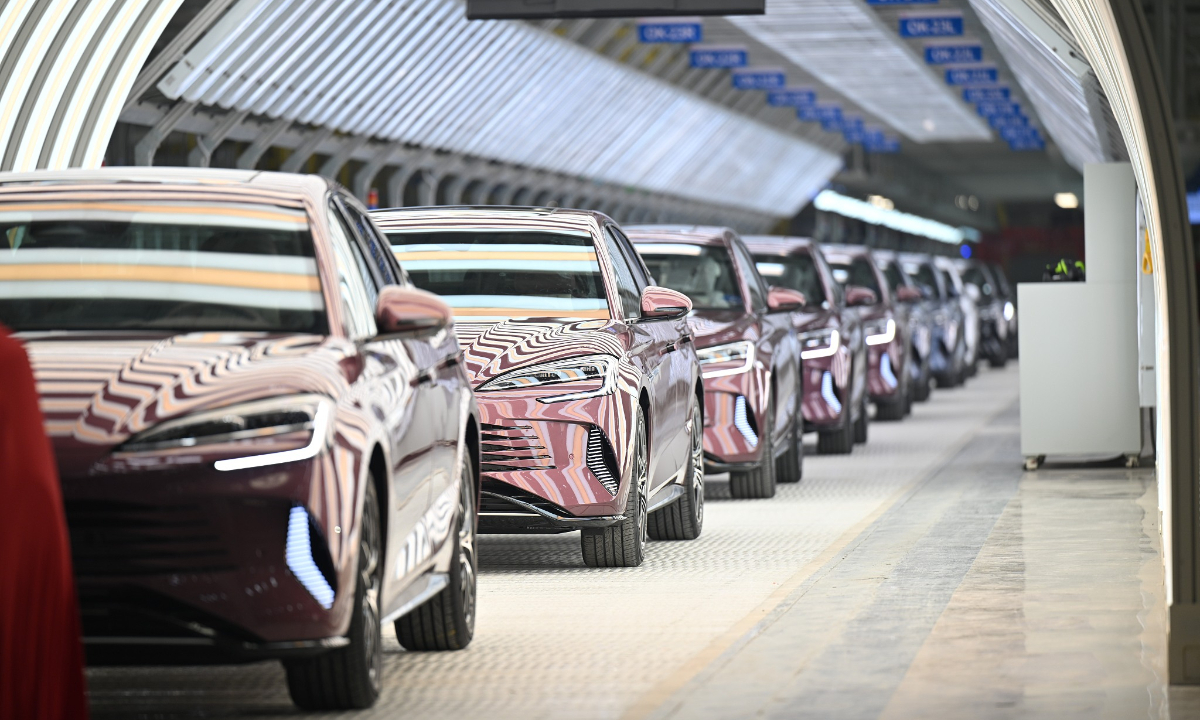
EV Photo:VCG
The US released a final rule on Friday stating that electric vehicles (EVs) using materials from China will not be eligible for tax credits, amid its attacks on China's EV industry with so-called "overcapacity" rhetoric.
Chinese experts said the limited access to tax credits targeting China, as well as the hype about China's "overcapacity," showed stepped-up trade protectionism and revealed US uneasiness about China's growing advantage in the global EV market.
The US Treasury Department announced final regulations for the credits under the 2022 Inflation Reduction Act. Americans buying EVs will no longer be able to claim federal tax credits of up to $7,500 if their cars contain Chinese materials, The Washington Post reported.
China's Ministry of Commerce (MOFCOM) said in December that China's EVs and auto parts are welcome in the global market, and excluding Chinese firms from these tax credits is a typical non-market-oriented policy.
The discriminatory subsidy policy violates the basic principles of the WTO, seriously disrupts international trade and investment, and undermines the stability of global industry and supply chains, the MOFCOM said.
Unlike the draft version in December, the final regulations allow carmakers to continue purchasing Chinese graphite until 2027 and still qualify for subsidies. According to US media reports, major manufacturers warned that without this extension, every EV on the market would be ineligible for the credit.
It indicates that the US has reached a deadlock in accelerating the energy transition and facing the consequences of forcing out the Chinese supply chains, experts said.
The Washington Post said that if the Biden administration moves too quickly to choke off Chinese supplies, it could miss its target for half of new cars to be zero-emission by 2030.
The Biden administration has been aggressively smearing Chinese EVs, hyping "overcapacity" in China's new-energy industry.
Chinese experts argued that the US claims are merely a guise for trade protectionism, reflecting its growing worry about China's advantage in the global market for new-energy products.
The difficulties and challenges that US car companies face are evident. In the first quarter, EV sales only grew by 3.3 percent to nearly 270,000, accounting for only 7.15 percent of total vehicle sales.
The so-called overcapacity rhetoric is a desperate attempt to suppress Chinese EVs in the global market, where the US cannot compete with China's high-quality and low-cost products, Qiu Wenxu, a research fellow with the Silk Road Academy of Social Sciences, told the Global Times on Saturday.
"The US can only try to hinder China's EV development through its usual trade suppression tactics. However, history tells us that trade protectionism has never been able to stop the globalization of goods, and will only increase the cost for consumers," Qiu said.
China's advantage in the new-energy sector has been built through continuous technological research and innovation, a complete industrial chain and mature manufacturing capabilities, Liu Chunsheng, a professor at the Central University of Finance and Economics, told the Global Times on Saturday.
According to the International Energy Agency, global demand for EVs will significantly increase and China, as the world's largest EV market, is expanding its production capacity based on reasonable expectations, Liu added.
In contrast to US' protectionist moves, China has taken steps to remove restrictions on foreign investment in the manufacturing sector.
A Chinese industry association recently released a list of 76 models of intelligent connected vehicles that meet the country's auto data security requirements, including those from Tesla. This development is seen as a positive step for Tesla's self-driving technology in the Chinese market.
Despite the "overcapacity" hype by some US officials, the recent visit of Tesla CEO Elon Musk to China and Tesla's development in China have offered successful examples of China-US economic and trade cooperation.
Experts said that it is crucial for the US government to rectify its discriminatory industrial policies to safeguard the stability of the global EV industry chain and uphold global climate change efforts.




